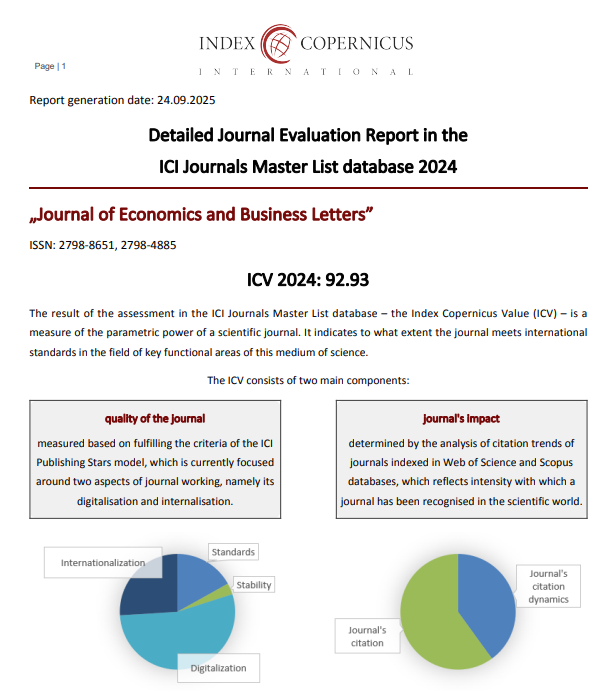The relationship between corporate governance and firm performance: An empirical analysis of Indonesian companies
DOI:
https://doi.org/10.55942/jebl.v3i3.224Keywords:
Corporate Governance, Firm Performance, Corporate Governance Perception Index (CGPI), Indonesia CompaniesAbstract
The goal of this study is to investigate the relationship between corporate governance practices, as indicated by the Corporate Governance Perception Index (CGPI) scores, and key performance indicators (ROA, ROE, EPS) of publicly-listed Indonesian firms. Utilizing a panel data set comprising 112 Indonesian firms across various sectors, both fixed and random effects models were employed to discern the effects of corporate governance on firm performance. The dataset spanned five years, resulting in a total of 560 observations. The findings revealed a positive and statistically significant correlation between superior governance practices and enhanced firm performance. Specifically, a one-unit increase in the CGPI Score corresponded with increases in ROA, ROE, and EPS, even after controlling for variables such as firm size and industry type. Corporate governance plays a pivotal role in influencing the financial performance of Indonesian firms. Firms adhering to higher governance standards showcased better performance metrics, underscoring the strategic importance of robust governance mechanisms in the Indonesian business landscape. The results hold significant implications for Indonesian businesses, investors, and policymakers. Effective governance practices not only serve as a beacon for potential investors but also position firms for sustained growth and stakeholder trust in an increasingly competitive and interconnected global economy.
References
Ab Razak, N. H., & Palahuddin, S. H. (2014). Corporate governance and earning management: Evidence from 200 Malaysian listed firms from the period of 2007 to 2011. Corporate Board: Role, Duties and Composition, 10(1), 6–17.
Arora, A., & Sharma, C. (2016). Corporate governance and firm performance in developing countries: Evidence from India. Corporate Governance.
Bathula, H. (2008). Board characteristics and firm performance: Evidence from New Zealand.
Ben Bouheni, F., Ammi, C., & Levy, A. (2016). Banking Governance, Performance and RiskTaking (C. Ammi, Ed.; p. 264). ISTE Ltd. https://doi.org/10.1002/9781119361480
Cadbury, A. (1992). Report of the committee on the financial aspects of corporate governance (Vol. 1). Gee.
Danoshana, S., & Ravivathani, T. (2019). The impact of the corporate governance on firm performance: A study on financial institutions in Sri Lanka. SAARJ Journal on Banking & Insurance Research, 8(1), 62–67.
Fahlevi, M., Moeljadi, M., Aisjah, S., & Djazuli, A. (2022). Blockchain Security and Corporate Governance. Int. Conf. Cybern. Intell. Syst., ICORIS. 4th International Conference on Cybernetics and Intelligent System, ICORIS 2022. Scopus. https://doi.org/10.1109/ICORIS56080.2022.10031537
Fahlevi, M., Vional, & Pramesti, R. M. (2022). Blockchain technology in corporate governance and future potential solution for agency problems in Indonesia. International Journal of Data and Network Science, 6(3), 721–726. Scopus. https://doi.org/10.5267/j.ijdns.2022.3.010
Husnah, H., & Fahlevi, M. (2023). How do corporate social responsibility and sustainable development goals shape financial performance in Indonesia’s mining industry? Uncertain Supply Chain Management, 11(3), 1383–1394. https://doi.org/10.5267/j.uscm.2023.5.099
Jensen, M. C., & Meckling, W. H. (1976). Theory of the firm: Managerial behavior, agency costs and ownership structure. Journal of Financial Economics, 3(4), 305–360. https://doi.org/10.1016/0304-405X(76)90026-X
Juhandi, N., Zuhri, S., Fahlevi, M., Noviantoro, R., Nur Abdi, M., & Setiadi. (2020). Information Technology and Corporate Governance in Fraud Prevention. In Warsito B., Sudarno, & Putranto Triadi T. (Eds.), E3S Web Conf. (Vol. 202). EDP Sciences; Scopus. https://doi.org/10.1051/e3sconf/202020216003
Lind, D. A., Marchal, W. G., & Wathen, S. A. (2018). Statistical Techniques in Business & Economics (17th ed., p. 897). McGraw Hill Education.
Pandey, N., Baker, H. K., Kumar, S., Gupta, P., & Ali, S. (2022). Board Diversity and Firm Performance: The Role of Contextual Variables. British Journal of Management, n/a(n/a). https://doi.org/10.1111/1467-8551.12675
Panisi, F., Buckley, R. P., & Arner, D. W. (2019). Blockchain and Public Companies: A Revolution in Share Ownership Transparency, Proxy-voting and Corporate Governance? Proxy-Voting and Corporate Governance, 19–100.
Saunders, M., Lewis, P., & Thornhill, A. (2009). Research Methods for Business Students (5th ed.). Prentice Hall.
Sekaran, U., & Bougie, R. (2016). Research methods for business: A skill building approach. John Wiley & Sons.
Yusuf, M., Hakim, L., Hendra, J., Kamar, K., Idawati, W., Winarso, E., Meiden, C., & Fahlevi, M. (2023). Blockchain technology for corporate governance and IT governance: A financial perspective. International Journal of Data and Network Science, 7(2), 927–932. Scopus. https://doi.org/10.5267/j.ijdns.2022.12.018
Downloads
Published
How to Cite
Issue
Section
License
Copyright (c) 2023 Journal of Economics and Business Letters

This work is licensed under a Creative Commons Attribution 4.0 International License.
















